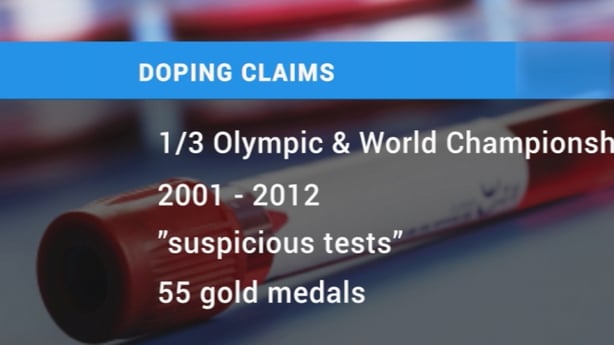The World Anti-Doping Agency has said it is alarmed by the size and extent of "wild" doping allegations after leaked test data from the International Association of Athletics Federations (IAAF) showed hundreds of suspect samples from athletes, including Olympic and world championship medallists.
The claims are made in reports being carried by the Sunday Times and German broadcaster ARD/WDR.
Both media outlets say they have been handed leaked data relating to 12,000 blood tests from 5,000 international athletes over more than a decade.
They say the data reveals "the extraordinary extent of cheating by athletes at the world's top events".
According to the reports, one third of medals in endurance events at Olympics and World Championships between 2001 and 2012 were won by athletes who recorded suspicious tests.

It is claimed that none of these athletes have been stripped of their medals.
Athletes from Russia, Ukraine and Turkey are claimed to have the highest percentage of abnormal blood test results.
Ireland, Canada, Serbia and New Zealand are among countries at the bottom of the list.
"These are wild allegations, wide allegations and we will check them out and have that done with the commission as quickly as possible," WADA chief Craig Reedie said.
An independent commission is already investigating previous allegations of mass doping.
"I am very surprised by the numbers from the leak from the IAAF I am sure they will want to look at it closely to determine the source," Mr Reedie said.
"It was the spread of the allegations that came from previous programmes (that surprised me). If you look at allegations on blood issues... they are even wider. So that's a concern. But I stress athletes are innocent until proven guilty."
When analysed by scientists, the tests showed more than 800 athletes had given blood samples that were "highly suggestive" of doping or "abnormal", reported the BBC, who added they had also seen the documents.
IAAF has said the report was based on private information that was taken without consent and that it reserves the right to take follow up action.

Although abnormal blood tests are not in themselves proof of doping, the release of the data will be an embarrassment to the International Association of Athletics Federations (IAAF) less than a month before its world championships in Beijing.
The IAAF introduced biological passports for athletics as part of its drug testing regime in 2009, which help in the detection of abnormal fluctuations in red blood cell counts.
Cheating by the use of banned substances has long been a scourge of athletics, from the systematic doping in the former East Germany, through Ben Johnson's disqualification from the 1988 Olympics to the BALCO scandal in the United States.
Sebastian Coe, a candidate for the IAAF presidency later this month, has said he will set up a new anti-doping body specifically for athletics.
He is running against fellow former Olympic champion Sergey Bubka in the election, which will take place on 19 August.

